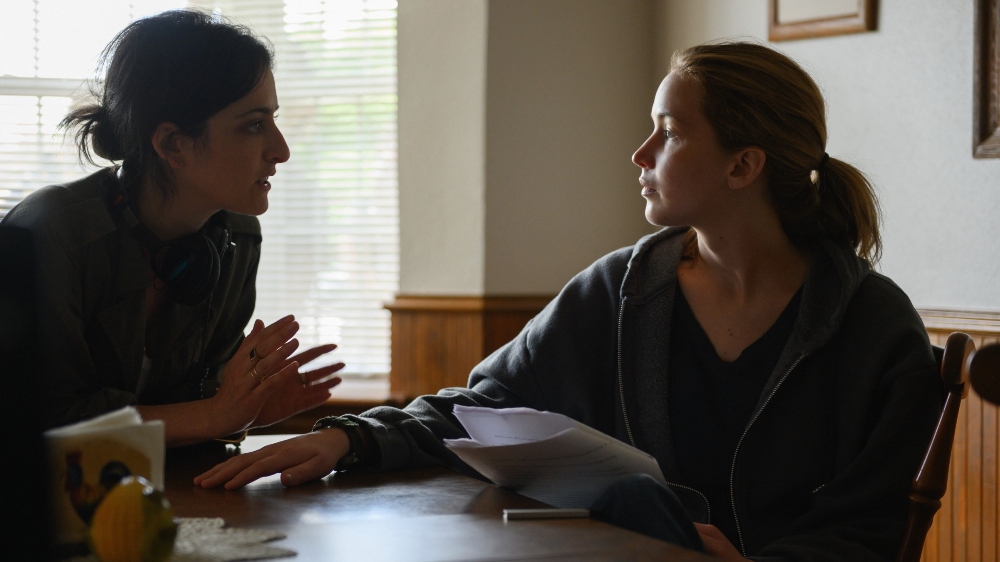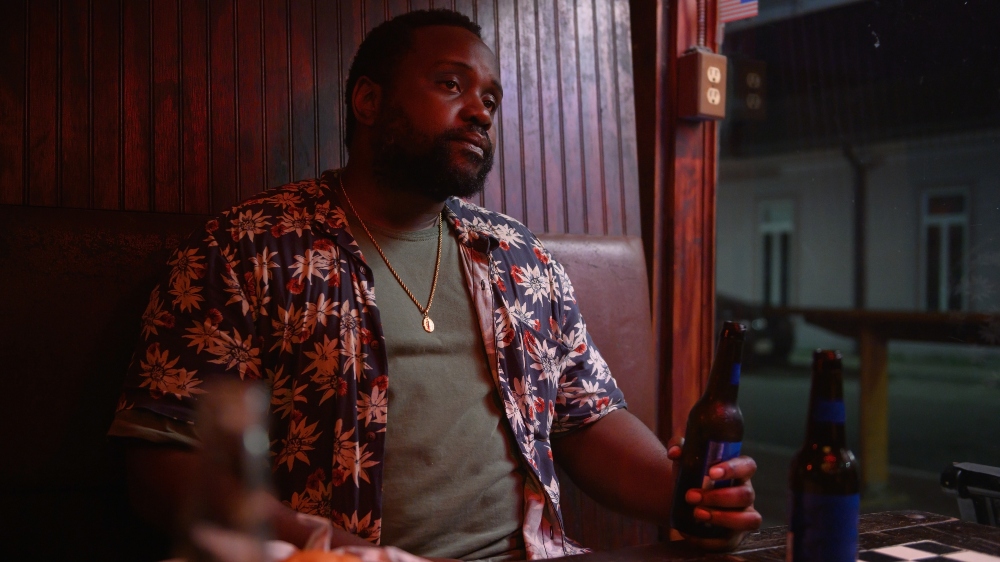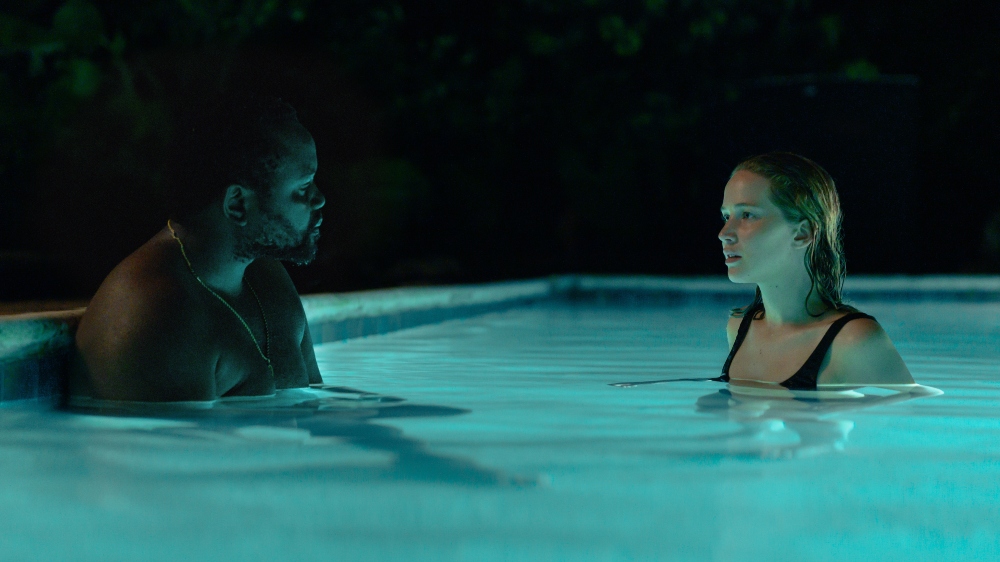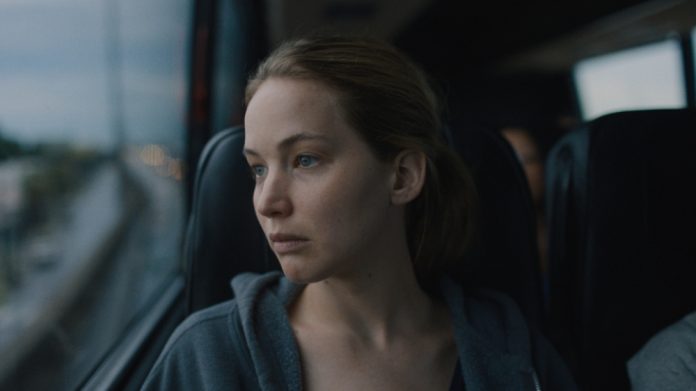Jennifer Lawrence and Brian Tyree Henry deliver awards-worthy performances in Causeway, a low-key indie feature that marks the film directing debut of noted theater director Lila Neugebauer.
Brooklyn-based Neugebauer has directed several acclaimed stage plays, including the Tony Award-winning drama The Waverly Gallery, and one episode each of Room 104, Maid, and The Sex Lives of College Girls, with the latter two shows coming well after she’d completed production on Causeway.
Now streaming on Apple TV+, the film follows the platonic friendship that forms between Lynsey (Lawrence), an American soldier who suffered a profound brain injury in Afghanistan, and James (Henry), the owner of a car repair shop in Louisiana, where Lynsey has moved back home to live with her mother (Linda Emond) while she recovers and struggles with PTSD.
Both Lynsey and James are private and guarded, two loners harboring tragic secrets, but steadily they emerge from their shells as they hang out together. Causeway is a modest film featuring a fairly simple story, and Neugebauer directs it as a no-frills two-hander that shines thanks to the quiet power of Lawrence and Henry as well as their special chemistry.
Below the Line recently caught up by phone with Neugebauer, who discussed what led her to direct features, Causeway’s long road to completion, working with Lawrence and Henry, and what she hopes to do going forward in her career.

Above the Line: You’re primarily known for your work in theater. How did the opportunity to direct this film even come about?
Lila Neugebauer: I have primarily been a theater director for 15 years. And I had always, in my heart, hoped to make movies. Like a lot of people, I’d just been keeping my head down and living my life one project at a time. Then, I started saying it out loud. I started saying out loud that I was interested in working [in] other mediums. Not long before I got this script, I’d gotten a television job that sort of dropped into my lap… a cold call from Mark Duplass, who was doing this anthology show. He said, ‘I have this episode. I think someone with a theater background should probably do it. I’ve heard you’re, like, great. Do you have four days free anytime in the next seven months?’ I was like, ‘Sure!’ Around the time that I received this script, essentially, I had started telling people that I was interested in making films. So people were sending me screenplays, [and] I was reading and sniffing around. Then I read this one, and it really stopped me in my tracks.
ATL: What was it about the script that stopped you in your tracks?
Neugebauer: The original script for this film that I read had this deeply felt lyricism, a real deliberateness, a patience, and a sensitivity. It was unconventionally structured. A lot of those things I admired, formally, in terms of the cinematic register. Though I am not a service member in the U.S. armed forces [and] I am not a veteran, I was startled by how connected I felt to this character’s inner life. I felt recognition, reading this script. It was personalized for me very quickly.
ATL: Features and theater are obviously very different beasts. How did you prepare to direct Causeway and how helpful was it to have that episode of Room 104 under your belt?
Neugebauer: I’d only been on a TV set for three days prior to shooting this film. On Room 104, we shot a 30-minute episode in three days, all on a unit set, on a stage. That was a great experience. I would say [that] how I prepared was by talking to as many filmmakers as I possibly could, and asking a lot of questions. Having spent a life watching movies and essentially trying to pay close attention to what interested me, and then in the course of preparing to make this film, [I] surrounded myself with brilliant veterans, who became my film school education.
I had the privilege of working with a true living legend — Production Designer Jack Fisk. I feel like Jack Fisk was my film school. I feel like I could write a book [thanks to] Jack Fisk, not only about the kind of filmmaker I want to be but about the kind of person I want to be. Please forgive me if that sounds a bit cheesy, but I really mean it. So, I had a really extraordinary team who equipped me to, I think, draw upon the ways in which my life directing theater had applicability, and where there were gaps in my knowledge, had the generosity of spirit to fill in those gaps and help connect dots for me.

ATL: A director can prepare all they want, but films often take on a life and personality of their own. What was the biggest learning curve for you here?
Neugebauer: I think the first thing I’d say is that much of the joyful recognition in this process has been realizing how completely aligned the creative processes are in the two mediums. What the mediums are up to philosophically, I think, is radically different. They’re completely different projects, actually — philosophically [and] ontologically. The processes in which [we] make them are structured in radically different ways, almost the opposite ways. But the core impulses [of] the director are aligned in every way.
In terms of your question [and] what surprised me, this is a project which began principal photography in 2019 and, due to a constellation of setbacks, did not complete photography until the summer of 2021. Even without that somewhat unorthodox — although now less unorthodox, in the context of the global pandemic — delay of two years in between completing a film, I think the endurance was what was new, the endurance that’s required [to direct a film]. A theater production is more compressed. When you direct a feature film, you are the throughline across a changing landscape of collaborators and creative processes. You live with it, and it lives with you, day in and day out. The stamina involved [and] the resilience required — it’s both a great responsibility, a weight, and it’s a thrill.
ATL: My understanding is that you’ve known Brian for a long time. How were he and Jennifer as collaborators, both with you and with each other?
Neugebauer: The greatest. You are right that Brian is an old friend of mine. I’ve known him since I was 19. I was an undergrad when Brian was at drama school. And Jen, I met in tandem with the inception moment on this project. Not long after I read the script, I found out that she had read it and had a similar reaction. We had dinner, connected immediately, and she signed onto the project that night.
Working with the two of them truly was an unmitigated joy. They were both very connected to these characters. They had hugely personal stakes in this filmmaking process. They had a lot of skin in the game. They were heavily involved in developing their characters, and in conversations about how that relationship would unfold that were meaningfully incorporated into script development conversations. And I think their instantaneous rapport and natural chemistry as actors and people is what makes the movie what it is.
ATL: Are you strictly a film director now? Or will you balance your budding feature career with TV and plays?
Neugebauer: Oh, yeah! I want to do it all. It’s my great hope to have a diverse ecology of mediums in my life. I think the next thing I’ll do is a play, but I have TV projects and a feature in early development. So, I am hoping to do it all.

ATL: You mentioned a moment ago that you spoke to various directors for guidance. Who gave you the best piece of advice, and what was it?
Neugebauer: I talked to some brilliant people. And I read a piece in which Ava DuVernay said, “Change your socks at lunch.” And I gotta tell you, she was right about that.
ATL: How so?
Neugebauer: I started shooting in 103-degree heat. So, that was vital.
ATL: Can you be objective when it comes to your own work? I’m just curious whether you’re satisfied with Causeway as it stands, or whether, perhaps in five or 10 years from now, when you’ve got several more films under your belt, you’ll look back and wish you had another crack at it with the benefit of experience?
Neugebauer: I think it would be remiss of me to imagine that I would have any kind of objectivity about what I’ve made at this point in time. I’m… I’ll be curious when I think of this piece, if I see it again in maybe 10 years. I’m just very curious.
ATL: Because?
Neugebauer: When you make anything, you spend a lot of time living inside it. And the process of releasing yourself from it is gradual, and releasing it from you. I mean, there’s a moment you stop working on it, right? You don’t change it anymore. But the process of releasing it from you, it’s not always in your control.
This is the first time that I will have an opportunity to have a permanent document. I’ve never had that before. My work has always expired. It’s evaporated. It’s ephemeral. So, I say “curious” because it will be a first for me to be able to see a permanent record, precisely as it was made. There’s theater on film and tape. There’s an archive at Lincoln Center where some of my productions have been recorded. But that’s not the experience, right? It is an archival record. It’s not the experience. I just don’t know what it will be like.
Causeway is now streaming on Apple TV+.



